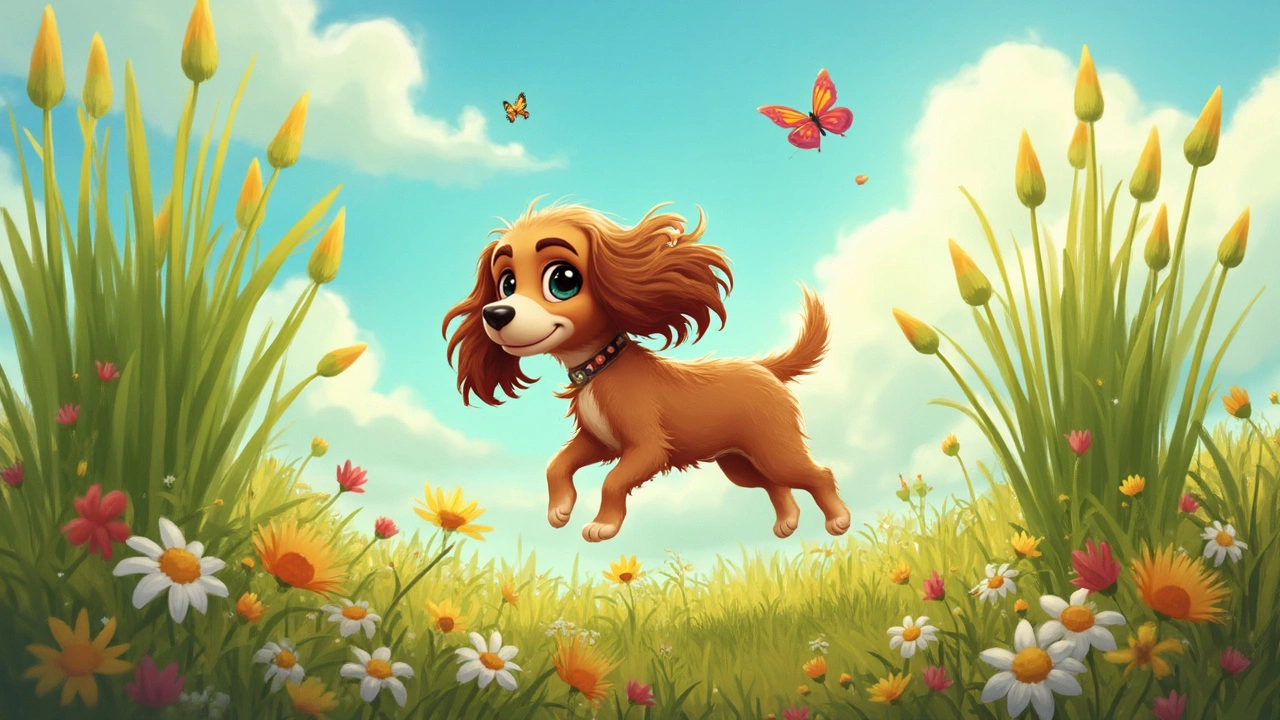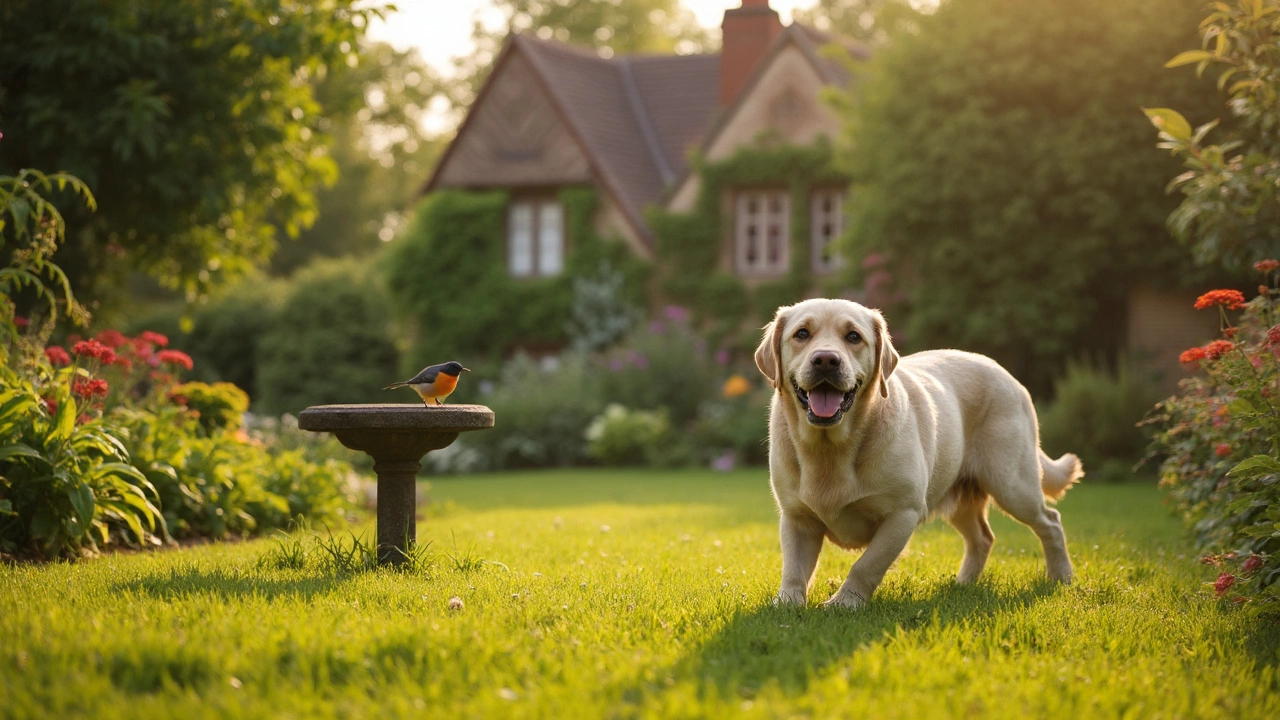You're out for a walk, enjoying the great outdoors with your beloved pooch when—just like clockwork—they stop and start munching on grass. If you've ever wondered why on earth dogs do this, you're definitely not alone. There's something strangely fascinating about it, right?
Firstly, it's not just your fluffy friend who does this. Many dogs eat grass as a part of their daily routine, like it's the most natural thing in the world. Some experts think it ties back to their wild ancestors who ate entire prey (fur and plants included) for a balanced diet. That said, for our modern dog buddies, it might just be a quirky habit.
On the flip side, your super-attentive self might worry if this means something's wrong. Is Fido lacking some nutrients? Maybe. But it's equally possible they just like the taste or texture! So, with these questions bubbling up, when should you raise the alarm? We'll explore that in the coming sections.
The Instinctual Behavior
Ever notice how our furry friends love grass like it's the world's coolest salad bar? It might look odd, but there's more to it than meets the eye. This behavior fascinates many experts, linking it to instincts passed down from their wild ancestors. Back in the day, wolves and other canines hunted animals that also happened to munch on plants — so by default, plants became a part of their diet too.
This means eating grass could be a natural holdover from a time when canines were less domesticated and more in tune with the forest life. Some folks figure it might help with digestion. Like a leafy 'n' green digestive aid, right? Though there's no solid science backing this, interestingly, a small study found that less than 10% of dogs who eat grass actually throw up afterwards, hinting at reasons other than just digestive help.
What's even more puzzling is that even dogs on a balanced diet — with all essentials covered through high-quality dog food — still can't resist the occasional grass nibble. Maybe it's a craving for variety? Or perhaps a deeply ingrained behavior they just can’t kick. Still, whatever the reason, it's usually harmless and can be a harmless quirk unless there's a noticeable change in them.
Now, if you're thinking of changing this habit, remember it goes back centuries, maybe even longer! So while supplements could help address any nutritional quirks, the grass-loving behavior might stick just because it's part of their makeup.
When to Worry
Most of the time, if your dogs are nibbling on grass, it's no big deal—just a quirky little habit they have. But here's when you should hit pause and consult a vet:
Persistent Vomiting
If after eating grass, your pooch is constantly throwing up, that's a major red flag. Occasional puking might just mean they needed to clear their system, but regular barf sessions? Not cool. Check with a vet to make sure there's no underlying issue.
Changes in Appetite or Thirst
Notice your doggo suddenly devouring unexpected amounts of grass, eating way less dog food, or gulping down water like it's going out of style? That behavior shift could be pointing towards digestive issues, so it's worth checking out.
Unexpected Weight Loss
Is your fur buddy shedding pounds without you even trying? Combined with the whole grass-eating gig, this could mean a nutritional imbalance or something more sneaky, like intestinal worms.
Obsessive Eating
If every walk turns into a grass feast, and your dog's more focused on munching grass than fetching the ball, it might be more than just a casual snack time. Sometimes, it's a sign of boredom or anxiety, but it could also be a health alert.
Harmful Grass and Plants
Not all greenery is friendly. Certain plants are toxic to dogs, so keep an eye on where they roam or munch. Avoid areas that could have been sprayed with pesticides or chemicals—they're not the crunchy snacks you want them enjoying.
Your dog's grass-eating habits can be totally normal, but with these warning signs, it's smart to stay on your toes. The key takeaway? If it doesn't pass the sniff test (literally and figuratively), chat with your vet.

Health Supplements Role
So, when we talk about our pup's odd habit of eating grass, we can't ignore how dog health might be part of the equation. Does your furry friend need a dietary boost? This is where dog health supplements could make a difference.
Experts often say that a well-balanced diet is key, but sometimes, extra help is needed to fill nutritional gaps. Maria Thompson, a veterinary nutritionist, notes,
"Sometimes, what looks like unusual behavior can actually be your dog's way of signaling a missing component in their diet. While some dogs eat grass just for fun, others might do it when they need something specific, like fiber."
Understanding Nutritional Needs
If you're considering supplements, you should know they come in many forms targeting different needs. A popular type is omega-3 fatty acids, which can benefit skin and coat health. Got a pup with a sensitive tummy? Probiotics could help balance their digestive tract, possibly reducing the urge to nibble grass.
It's interesting to note that a lack of fiber can make some dogs munch on grass. In such cases, increasing dietary fiber might be all you need. Fiber-rich supplements can be an easy fix, ensuring your pet's gut is happy and healthy. Always consult with your vet before adding anything new to their diet, though, to tailor the approach to your dog's specific needs.
Choosing the Right Supplement
Before snagging a bottle off the shelf, check for quality ingredients. Go for trusted brands that list all ingredients clearly. Vets often recommend supplements that meet the standards of the National Animal Supplement Council (NASC). Doing a little homework here can go a long way in ensuring your dog gets the best.
- Always read labels for dosage instructions.
- Look for products with minimal artificial additives.
- Choose hypoallergenic options if your dog has allergies.
If in doubt, bring it up with your vet—they can guide you toward what your pooch might need without the guesswork. Introducing the right supplements could not only curb some of the grass-eating but keep your dog in tip-top shape.
Managing the Habit
So, you're dealing with a dog who loves to munch on grass. Don't worry, it's a habit you can manage. While it might seem harmless, there are times you want to steer them away from this behavior to ensure they stay healthy.
Keep an Eye on Ingredients
First off, not all grass is dog-friendly. Many lawns are treated with fertilizers or pesticides that can be harmful. Have a designated safe spot at home if your pet insists on chomping grass. And when you're visiting new places, it's a good practice to keep an eye on where your dog snacks.
Regular Health Checks
It's always a good plan to get a vet involved if the habit seems excessive. According to Dr. Emily Wilson, a respected veterinarian at PetCare Clinic,
"While most grass-eating is non-threatening, it's recommended to have your pet checked if it's paired with vomiting or behavioral changes."Regular check-ups will help you keep tabs on their health and dietary needs.
Balance Their Diet
A balanced diet can sometimes curb the behavior. Try adding fiber-rich foods or check into dog health supplements that might provide the nutrients they crave. Dogs sometimes eat grass because they're simply trying to fill a gap in their diet.
Distract and Engage
Engagement is key. When out walking, carry toys or rewards to distract them when they show interest in grass. It's all about redirecting that attention. Why not try a game of fetch or a small treat incentive? It's an easy peasy way to keep them on their toes.
Getting into the nitty-gritty of your dog's habits might seem daunting, but with a bit of attention, you're all set to manage that grass-munching curiosity effectively.
